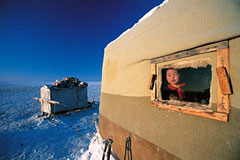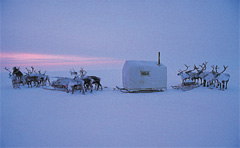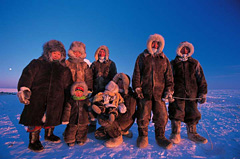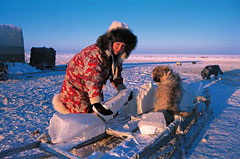4 months in the Sakha Republic with the Dolgan and Even nomads
 Siberia
covers 67 percent of the Russian territory and is populated by over
30 indigenous ethnic groups. Sakha is its largest Republic, covering
3,100,000 sq. km., i.e. ten times the size of Italy, but it has only
one million inhabitants. Half of it is located beyond the North Pole
Circle and it is fully within the permafrost area, i.e. where the soil
is permanently frozen.
Siberia
covers 67 percent of the Russian territory and is populated by over
30 indigenous ethnic groups. Sakha is its largest Republic, covering
3,100,000 sq. km., i.e. ten times the size of Italy, but it has only
one million inhabitants. Half of it is located beyond the North Pole
Circle and it is fully within the permafrost area, i.e. where the soil
is permanently frozen.
The active surface layer, i.e. the layer which thaws during the Summer
and freezes again in the Winter is approximately 3 meter deep, whereas
the layer which has been permanently frozen since the latest Ice Age
approximately 10,000 years ago varies in depth from 300 to 1,500 meters.
It is not by chance that the village of Oimyakon, in Yakutia, hosts
the “Pole of Cold”, the coldest inhabited area on Earth,
where the temperature drops as low as - 71°C.
 The
nomadic inhabitants of Dolgan used to be hunters and today rear reindeer
(Rangifer tarandus). The population amounts to no more than 7330, 70
% of whom live in the Taimyr peninsula and the rest in the Anabar district,
in the Republic of Sakha (former Yakutia).
The
nomadic inhabitants of Dolgan used to be hunters and today rear reindeer
(Rangifer tarandus). The population amounts to no more than 7330, 70
% of whom live in the Taimyr peninsula and the rest in the Anabar district,
in the Republic of Sakha (former Yakutia).
Their herds produce leather and meat, which are sold all over Siberia.
There are over 20,000 reindeer in Yakutia. Each of the several “brigades”,
i.e. the clans of breeders, owns 3000.
Despite the collapse of the USSR and the “communes”, most
families living in the tundra receive a salary from the Government,
who still today owns the reindeer and wants to keep a territory very
rich in oil and diamonds under control (99% of the diamonds mined in
Russia, i.e. one fourth of the world production, come from Siberia).
The nomads own 20-30 reindeer at most and hunt wild reindeer to eat.
If, as is often the case, the wolves kill animals that are property
of the Government, the Dolgan population must pay money to compensate
for the loss. However, the Russian Federation today encourages a certain
degree of independence of the local peoples.
 The
Dolgans are a unique people because the live in baloks, wooden houses
built after those of the first fur traders in Russia. Their size is
4 x 3 metres, they host 4-5 people and contain two or three single
beds or a large double bed, a small window that is blocked with reindeer
skin, a table and a stove.
The
Dolgans are a unique people because the live in baloks, wooden houses
built after those of the first fur traders in Russia. Their size is
4 x 3 metres, they host 4-5 people and contain two or three single
beds or a large double bed, a small window that is blocked with reindeer
skin, a table and a stove.
During the winter the nomadic people leave from the northern arctic
coast, move south and camp not too far from the northern boundary of
the coniferous forest, a source of firewood: when the reserves are
depleted, they travel from 10 to12 hours a day at -50°C. Three
days travelling by sledge are necessary to find clean frozen lakes
from where ice is obtained to have the water necessary for cooking.
The Dolgans love open spaces: their baloks simply ensure their survival.
 Their
real home is the endless horizon, which they always bear in their hearts:
beyond the horizon there is always the void, which they never fear.
Every morning they use their lassos to capture the few reindeer still
in the camp site, tie them to the sledges and reach the moving herd
to take the animals back to the camp site. One day the reindeer move
too far: it is time to go. During the Winter, the Dolgans move their
camp site every fortnight.
Their
real home is the endless horizon, which they always bear in their hearts:
beyond the horizon there is always the void, which they never fear.
Every morning they use their lassos to capture the few reindeer still
in the camp site, tie them to the sledges and reach the moving herd
to take the animals back to the camp site. One day the reindeer move
too far: it is time to go. During the Winter, the Dolgans move their
camp site every fortnight.
The nomadic people cook and eat reindeer meat, which is light and
very good, and straganina, frozen raw whole fish which is dipped in
salt. However, the real delicatessens of the tundra are frozen raw
reindeer kidneys and liver.
 Candles
are lit in the evening. Anufri junior comes to my balok. I ask him: “If
you could leave, what place would you like to visit?” “Paris!” Anufri
answers with no hesitation. “Why Paris?” “When I
was in the village of Yuriung Khaia, I once saw a TV documentary on
the Eiffel tower and I would like to climb on top to discover what
it is like to see all the lights of a large city from above…” Tomorrow
is Karal day, i.e. when the reindeer are counted; many men have come
to sleep here from other camp sites to help Ivan and his family. Everyone
expresses his or her secret wish: Ivan, the chief of the camp, would
like to see the Pyramids of Egypt, Zinaida would rather meet the Lapps
and compare and contrast their reindeer…
Candles
are lit in the evening. Anufri junior comes to my balok. I ask him: “If
you could leave, what place would you like to visit?” “Paris!” Anufri
answers with no hesitation. “Why Paris?” “When I
was in the village of Yuriung Khaia, I once saw a TV documentary on
the Eiffel tower and I would like to climb on top to discover what
it is like to see all the lights of a large city from above…” Tomorrow
is Karal day, i.e. when the reindeer are counted; many men have come
to sleep here from other camp sites to help Ivan and his family. Everyone
expresses his or her secret wish: Ivan, the chief of the camp, would
like to see the Pyramids of Egypt, Zinaida would rather meet the Lapps
and compare and contrast their reindeer…
I grow curious and ask: “If you were given a job in one of those
places, would you go?” Complete silence. Ivan raises his head
and becomes the spokesman for all. He looks into my eyes and with astonishing
certainty states: “We shall never leave our reindeer”.
Look at it carefully! A geographical map always has many colours
indicating mountains and plains, seas and rivers, volcanoes and islands,
glaciers, deserts and all the rest... This was how the Earth was and
is.
To survive, the first living creatures learnt to adapt to these different
features of the land. This is how variety was created, spontaneously. In
every form of life.
I want to imagine a moment, in the history of the world, in which different
creatures could live peacefully together.
Perhaps the deterioration of this garden of harmony began as people evolved
and no longer had only to worry about surviving. They found they had the
time to consider their differences as something to vaunt and use as a form
of power....
Do you like the fact that there are many populations different from
yours in the world?
Why do you like it or not like it?
How do you think these populations are “different”?
Do these differences make you afraid or do they make you curious?
Is a “different” person less important than you and your usual
friends?
How would you react if a Siberian child were to enter your class now? What
would you tell him or her? What would you ask him or her about?